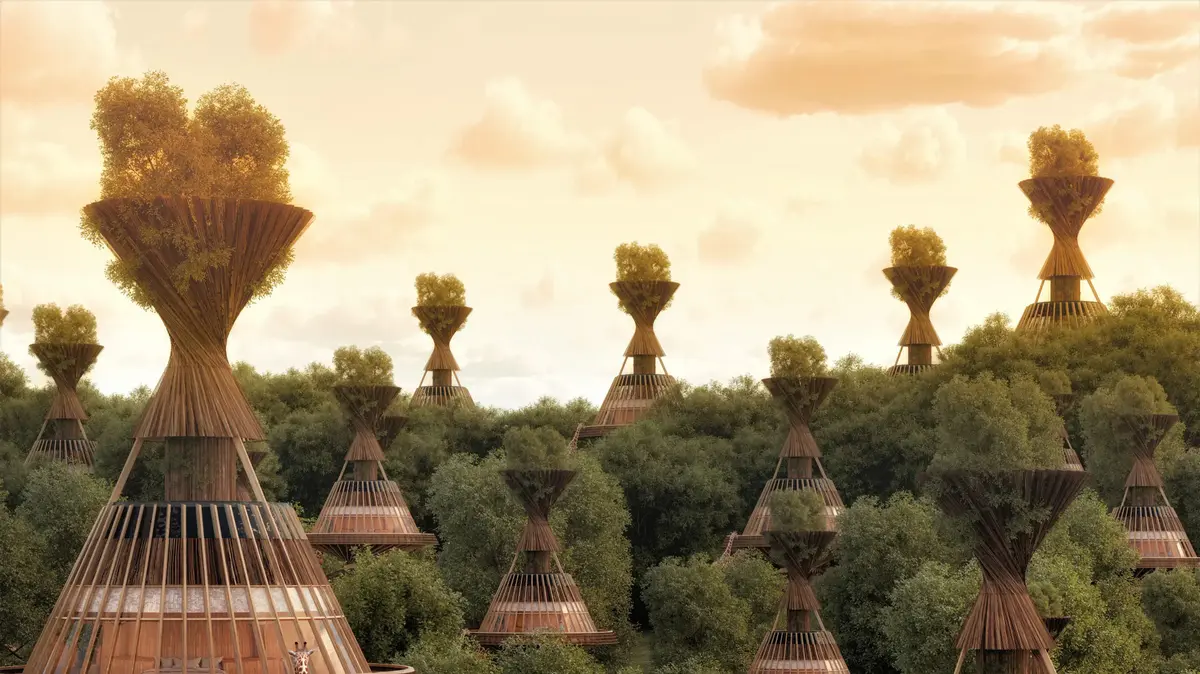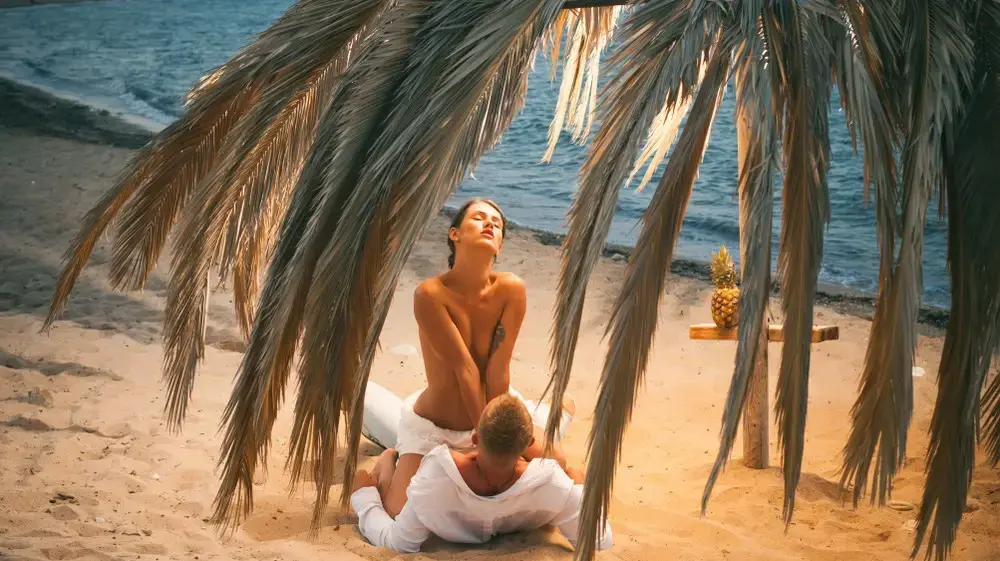Safari in the Serengeti Reserve, Tanzania (photo and editing: Dan Lior)
When they say "safari" to you - what do you think of?
Certainly on elephants, and probably also on giraffes, grasslands, savannahs, tigers and lakes.
And say, when they say "safari" to you, do you also think of noisy jeeps?
On the dirt of tourists?
About polluting vacation cabins?
About carbon footprint?
Yes, it may not be pleasant to think that our vacations come with an environmental price tag, but the truth is that resorts, especially those built in natural areas, may damage nature reserves and the animals that live in them.
And the forecast for those going to Europe: it's going to be hot and really not cool
Earth Day: how important is it to you that your vacation be environmentally friendly
So probably not all the problems created by the safari industry will be solved in the near future, but one architectural office has decided to take this industry one more step in the green direction: soon a first sustainable resort of its kind, its wooden cabins, will be built in one of the safari sites in the northwest of South Africa They will produce their own water and electricity that the guests will use on site.
Is this the next gospel of the world of tourism?
Simulation of the resort in the northwest of the country of South Africa (photo: MASK Architects)
The wooden cabins will themselves produce the water and electricity that the guests will use (Photo: MASK Architects)
This is the first sustainable resort of its kind (Photo: MASK Architects)
Africa on the map
In recent years, the global safari market has been on a constant rise: in 2021 it was estimated at 32.3 billion dollars and is expected to continue to climb, with forecasts standing at 5.3 percent each year until 2030. Of all the countries where there is a safari, such as Thailand, India, China and Brazil - African countries are the undisputed kings of this industry: they have the largest market share, which is estimated at approximately 18 billion dollars and which constitutes over 50 percent of the global safari market.
Due to the fact that Africa is also the poorest continent, the industry's contribution to the local economy is exceptionally vital.
However, this market also has a problematic side.
"The tourism industry greatly increases man's ecological footprint, and because of this it also has a negative effect on him," says Dr. Tamar Ron, an international consultant for the preservation of biological diversity. The natural water, waste generated as a result of construction and polluting substances involved in it and more.
In addition, the ancillary services offered by this industry also cause widespread problems: the garbage produced by tourists and which pollutes nature;
the vehicles used in the safari areas - which create air, light and noise pollution, and cause damage to the soil, plants and animals;
And the fact that many tourists feed the animals in the reserves in a way that may cause them many problems, from losing their ability to search for food independently to death due to feed not adapted to their needs.
The global safari market is constantly on the rise.
In 2021 it was estimated at 32.3 billion dollars (Photo: MASK Architects)
The architects' office designed the buildings inspired by the baobab trees, which originate from the savannahs of Africa (Photo: MASK Architects)
Salt water
Due to all of this, the Italian architecture firm MASK Architects has taken on a tourism-environmental challenge that may solve some of the difficult problems that the safari tourism industry suffers from: the firm has designed a new resort in the northwest of South Africa, whose wooden cabins will produce the water and electricity required for their guests by themselves .
From a design point of view, too, the architectural firm decided to stay "close to nature", and designed the buildings themselves inspired by the baobab trees, which originate from the savannahs of Africa.
According to the design of the architects' office, the new cabins will generate the electricity that the tourists will use with the help of solar panels that will be placed on the roofs of the buildings.
In addition - and this is the real hit of the resort - every building on the site will be equipped with a system that uses green energy - the solar electricity produced on site - to produce water from the air.
How will she do that?
Air that will be absorbed by the filters that will be installed on the buildings, will be processed in another filtration system that you will find under the ground - that will produce water from the extraction and condensation of the abundant moisture that is found in the air in this area.
Producing electricity and water in such a local manner will avoid the construction of expensive water and electricity transmission infrastructures that damage open areas, and will help the site become immune to droughts, fires, faults in the local electricity and water network, and more.
Moreover, the water that will be produced with the help of the technology in question will also be used for all the water needs of the local guests, who will thus be able to avoid wasting the precious local resources - and the residents of the nearby villages.
"Helping provide water to the nearby local communities is a wonderful direction for this type of venture," says Ron.
"However, at the moment the project is in the initial stages and we will have to wait and see to what extent it actually implements what it promises."
The new cabins will generate electricity with the help of solar panels that will be placed on the roofs of the buildings (Photo: MASK Architects)
Each building on the site will be equipped with a system that uses green energy to produce water from the air (Photo: MASK Architects)
"The more the resorts reduce their carbon dioxide emissions - they will turn in a better direction" (Photo: MASK Architects)
Ethical tourism
The move in question raises the question: Can tourism help in additional aspects to the region where it takes place?
And if so, how?
According to Ron, tourism can help nature conservation, because it can provide some of the economic resources that are required for such conservation.
In addition, according to Ron, alongside many safari reserves in the world live local populations for whom this market may provide a livelihood that does not harm the local nature.
"In places where the local populations do not have many sources of livelihood, they are often forced to support themselves by hunting, logging and extreme exploitation of natural resources," she explains.
"Therefore, tourism as offered by the safari industry can serve as a significant source of income for the local population."
According to Ron, such a situation can also encourage the countries in question to prioritize nature conservation over unsustainable land uses.
If so, does the solution to funding nature reserves lie in tourism itself?
"Of course we would like all the revenue from this industry to go to the nature conservation bodies and the local communities," says Ron, "but unfortunately, this is not what happens in practice: the tourism operators, some of whom are not in Africa at all, are the ones who earn a significant portion of the money."
According to Ron, this situation is a sort of inheritance from the colonial era, when external factors to the continent used its resources.
"This situation needs to be balanced. It is important that most of the money from tourism remains in the hands of the states and local communities," she says.
But how do you do it?
According to Ron, the African countries can, for example, enact laws that will ensure that the payment for tourism in Africa and especially in the nature reserves - stays on the continent.
Plus, she also has some advice for us.
"I recommend everyone who wants to go on safari in Africa to open the Internet, look for a local company, and give up traveling through 'third-party' companies from non-African countries, unless they make sure to transfer most of the profit to countries and communities in Africa."
And regarding projects like the one that will be built in the south of the continent - according to Ron, this is a good direction for everyone.
"Solar panels and water systems like the ones installed in the wooden cabins - are good solutions," she says.
"The more the resorts reduce their carbon dioxide emissions, and are designed in a more environmentally friendly way - they will turn in a better direction," she concludes.
The article was prepared by
Azula - the news agency of the Israeli Association for Ecology and Environmental Sciences
tourism
news
Tags
Africa
Hotels
ecology
electrical power


/cloudfront-eu-central-1.images.arcpublishing.com/prisa/XQYTTC7NDBDQTFDHAE2YZ6MAEI.jpg)









